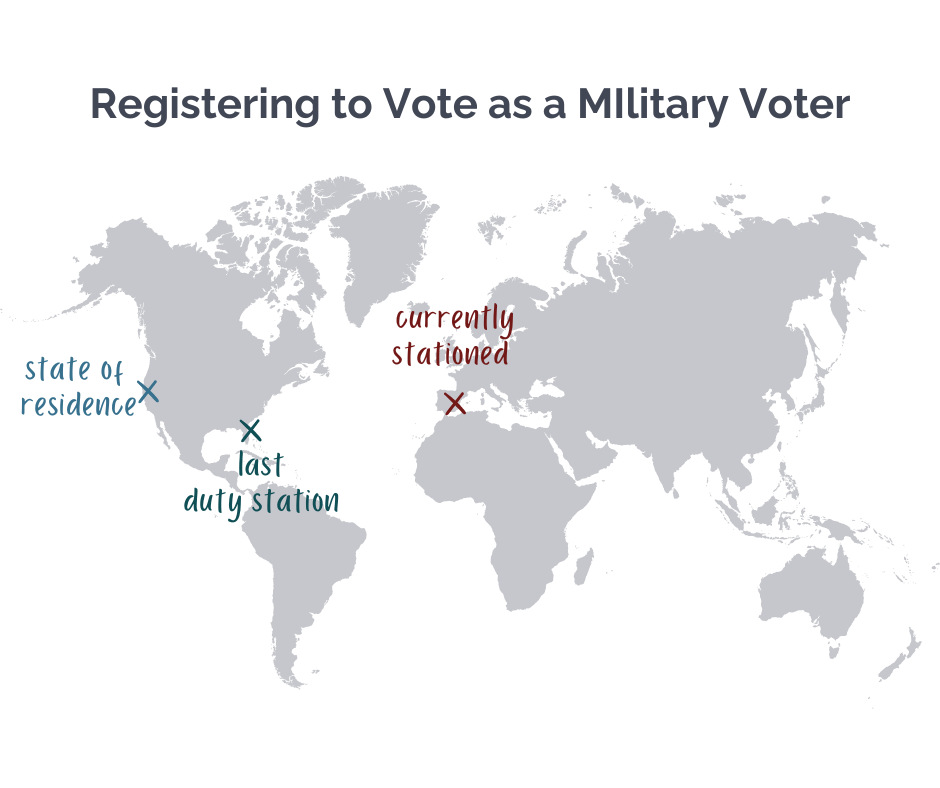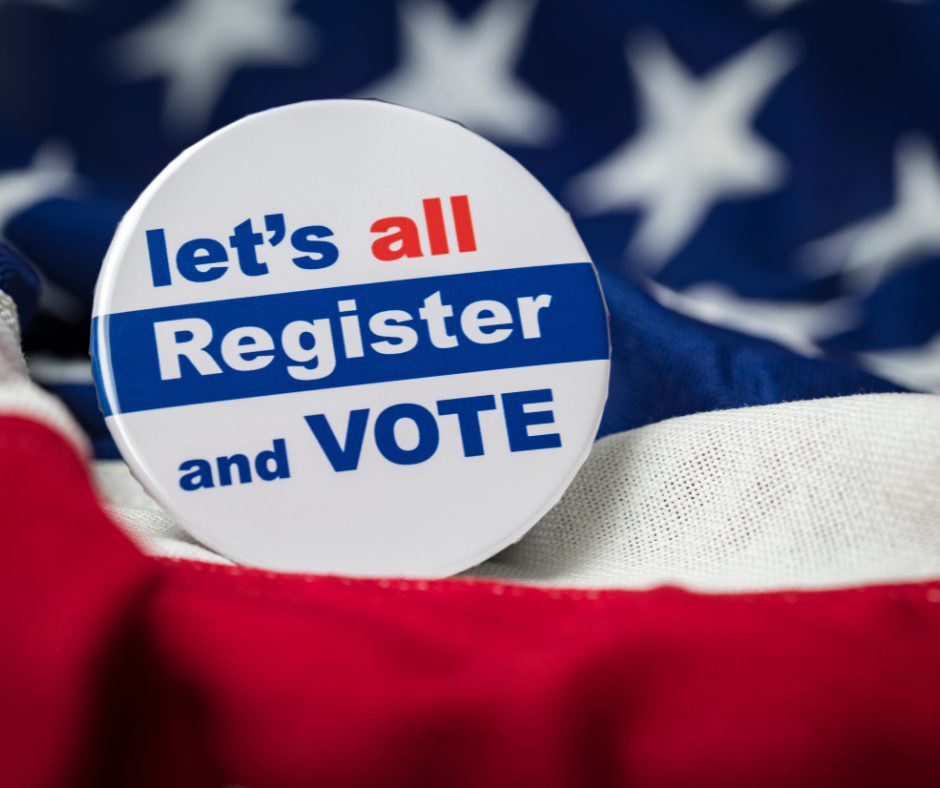As a military voter, there may be extra t’s to cross and i’s to dot to ensure you’re ready to vote.
Registering to Vote as a Military Voter
To recap, there are two main options for voting as a military voter:
- Register and vote locally wherever you are located as long as you can prove local residency,
- Or, register and vote at your State of Residence (SOR), which likely requires you to request an absentee ballot as you are not voting in-person locally.
- A semi-third scenario is if you are overseas in a foreign country, then you may register and vote either where you were last located prior to moving overseas or at your State of Residence address. Choosing the most-recent CONUS address would also mean changing your residency to that address at the same time.
For example, my military sponsor’s SOR is California, and we were most recently stationed in Florida before PCSing overseas to Spain. I may choose to register and vote in either California or Florida. If California, I would register with the address that is attached to the SOR. If Florida, I would use our most recent residence address. I would use the Federal Post Card Application to register and request an absentee ballot in one form. Alternately, I could contact the appropriate Board of Elections office and complete the process to register, requesting they send me an absentee ballot for all upcoming elections at my current address in Spain. Voters with access to an APO/FPO address should use that as a mailing address instead of the foreign country’s address.

Regardless of military-connected status, any U.S. citizen, wherever in the world they live, may vote in their legally-registered district.
Don’t worry, we have a wide variety of military voter resources, including a military-connected voter quiz to help you determine where to vote and the best method to register.
Certain states, like Minnesota, Washington, and Colorado, have made the process for military voters quite easy. Measures may include: options to opt into a permanent absentee voter list, online voter registration, and receiving and submitting ballots by email, but check with each state for complete instructions.
Then there are other states, like the ones listed below, that make a military voter jump through a few more hoops.
Hoops may include re-registering to vote because you may have been purged from voter rolls and cumbersome signature verification steps.
Tricky States for Military Voters
If you are a military voter registered in Arizona, Florida, Georgia, Pennsylvania, or Texas, read below and make sure your vote will be counted!
Arizona requires the mail-in voter’s signature to match the signature(s) the office already has on file. New since 2021, the state may remove a voter from its permanent mail voting list if a voter has not voted an early ballot in all elections in two election cycles and then the voter fails to respond to the clerk’s mailing inquiry within 90 days. Also new since 2021, if you forgot to update your mailing address, and if you missed voting in the last couple elections, there’s a risk that your election official placed you on an “inactive voter list” and could cancel your registration altogether. The good news is that ballot tracking is available and a voter may have an opportunity to correct an error, also known as ballot curing, by end of the day on Election Day; therefore, it is vital that military voters vote early enough to track and verify that their vote was counted, and if not, to have enough time to correct any issues! (UOCAVA Secretary of State AZ portal; Maricopa County UOCAVA portal)
Florida purges voters from their registration rolls if the voter has not voted for four years. New since 2021, Florida now requires an ID number with mail-in voters’ applications — either a Florida Driver’s License number or the last four digits of one’s Social Security Number. Florida has also cancelled some vote-by-mail requests. The good news is that ballot tracking and ballot curing (up to two days after Election Day) are both available. Once again, it is vital that voters register and vote early enough to ensure their ballot is counted and/or can be corrected if necessary.
Georgia removes a voter from their registration rolls if the voter has not voted for five years. Another key challenge for Georgia voters is the ease of voter challenges, in which a neighbor may challenge one’s legitimacy to vote; the challenged voter must then appear in-person at a hearing to verify their eligibility. Military voters are particularly vulnerable to voter challenges as any change of mailing address or non-residential mailing address could trigger a challenge. New since 2021, Georgia now requires a state-issued ID number or the last four digits of one’s Social Security Number on their return ballots, or to sign an affirmation. The good news is that some ballot tracking does exist and ballot curing is available up to 3 days after Election Day. If you vote in Georgia, we want to hear from you!
Pennsylvania, as a state, does not mandate ballot curing, it is dependent by county; ballots must be remedied by Election Day, unless it is ID-related, then the voter has up to six days post-Election Day. In other words, a voter may not have an opportunity to remedy any issues on their ballot in order for the vote to count. New since 2021, the security envelope for mail-in voters were tricky for many voters, which led to litigation. The security envelope has since been re-designed but may still be tricky for voters. It is important for voters to pay attention to this structural item in this upcoming election and note if they have the opportunity to cure their ballot! Once again, it is vital for mail-in voters to vote early enough to track and remedy any issues. Another key issue for Pennsylvania is that although voters may not be purged from registration rolls, they may be removed from permanent mail-in rolls after not voting for “a lengthy period of time,” but that length of time has yet to be determined. Permanent mail-in registration rolls are a key feature to enabling military voters to vote while serving the country without adding additional steps to verify their registration status. One good news item for Pennsylvania voters is that an identification is only required for vote-by-mail if the voter did not register with it.
Texas mail-in voters must pay for postage, which differs from most other states. New since 2021, an ID number is required on the absentee ballot envelope, which has to exactly match the ID number one originally registered with no matter how long ago. This was a huge issue in 2022 when 18,000 mail-in votes were rejected due to this new rule. The good news is that ballot tracking and ballot curing are available, up to six day after Election Day.
The bottom line: register early, check your status, and submit your ballot correctly and as early as possible so you can track your ballot and cure any issues in time!

